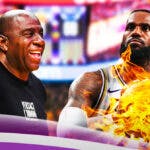Whether by teammates leaving, the direction of the franchise or just the individual themselves, there has been an overarching trend which has been been prominent throughout the start of the 2016-17 NBA season. That trend being the incredible individual performances amongst the NBA elite players, and yet despite these ridiculous stat lines, the correlation to team success been less strong than one would expect.
The list of players that could be included in the MVP conversation with relatively weak supporting casts is longer than ever. There's James Harden of the Rockets, and to some degree, Damian Lillard of the Portland Trail Blazers. However, two players and their teams portray this situation above and beyond the others: Anthony Davis of the New Orleans Pelicans and Russell Westbrook of the Oklahoma City Thunder.

Both are clearly averaging numbers of MVP caliber and yet are not quite in the same discussion as LeBron James, Kevin Durant, Stephen Curry or Kawhi Leonard. Unfortunately for Westbrook and Davis, the league prioritises wins, standings and records over a player’s individual statistical averages. Only Karl Malone in 1999 and Michael Jordan in 1988 have won the MVP outside of their team being a top-2 seed in their respective conferences.
So let’s first take a look deeper into what makes Westbrook an player but without an MVP team.
Russell Westbrook
The unprecedented and undisputed stat sheet stuffer of the league, Russell Westbrook currently holds the league’s best points per game (31.8), is a top 15 rebounder (9.6) and is the second best assister per game at (10.6 per game and 24.5 assisted points per game). Since Durant’s shock departure to the Golden State Warriors it was natural for NBA fans and analysts to suggest that Westbrook’s production would go up. Comparing his 2015-16 and 2016-17 seasons, Westbrook has had increases of:
- +8.3 points per game
- +1.8 assists per game.
But the statistical measure I find most staggering is Westbrook's usage rate. Westbrook compared to when he played with Durant is now owning the league’s highest 41.3 percent usage rate. What this means in simple terms is that a staggering 41.3 percent of Thunder possessions (of which they average around 104.5 per game) end in Westbrook either shooting the ball, turning the ball over or getting to the free-throw line. To put that into perspective, if the season were to end today Westbrook's 41 percent usage rate would be the highest ever, even more than Kobe Bryant’s 2005-06 season and Allen Iverson’s 2001-02 Season.
It is undeniable how much better the Thunder look when Westbrook is on the floor. He currently leads the league in Plus-Minus at +15.5 when he is on the floor vs off of it. In addition, Westbrook has the league’s highest value over replacement player (VORP) at 2.3 for the season.
So with all these metrics alluding to how much better the Thunder are with Westbrook, one has to wonder why is it not converting into wins? Westbrook’s impact is as much positive as much as it is negative, and his teammates do nothing to help this either. Outside of Westbrook only Steven Adams, Enes Kanter and Victor Oladipo average over 10 points per game. Adding Westbrook’s points per game and his assist points per game, that means that only 45 percent of OKC’s total 105 points come from Westbrook not scoring or assisting on the play. Coupled with their 23rd ranked offensive rating (101.00), nothing screams balanced. This inability to get production outside of Russell does very little to convert to team wins.
Westbrook’s defensive metrics also raise questions. While the Thunder as a team currently hold the sixth ranked league defense (101.40), opposing players are shooting considerably better when guarded by Westbrook (+7 field-goal percentage when guarded by Westbrook). It is fair to assume that the sheer offensive load Westbrook carries may translate into defensive mishaps. The Thunder will need to tune in at point guard defensively to make sure those Westbrook points are actually utilised in strong wins.
Probably the most reoccurring rhetoric in regards to Westbrook is how he holds the league’s highest turnovers per game at over five per game. Naturally someone who passes as much as he does will have a higher turnover total but his Assist-to-Turnover Ratio at 1.94 would suggest that he will need to limit this.
Ultimately it is a combination of multiple things that see the Thunder not translating Westbrook’s incredible individual performances to team wins. Inevitably the Thunder will need to get a more consistent and better production out of its other players all while Westbrook locks down those simplistic mistakes he makes. It is undeniable how important Russell is for the Thunder, but they haven’t looked good on either ends of the floor of late with sloppy losses to the Kings, Lakers, Magic and Pistons – all teams they are superior to.
As mentioned earlier a MVP will only be given to a player on which their team is high standing. Russell’s individual statistics all scream MVP but his team record does not. Westbrook has already played over 550 minutes and is averaging almost 35 per game. Ultimately doubt lies within whether when it comes to playoff time with a gruelling schedule Russ has enough to put the team on his back to win a playoff series – especially when he will likely face an elite Spurs, Clippers, or Warriors in the first or second round.
Prediction: Playoff team seeded fifth to eight, eliminated first or second round.
Anthony Davis' situation is no better. Take a look here for an in-depth look at AD's MVP chances.




